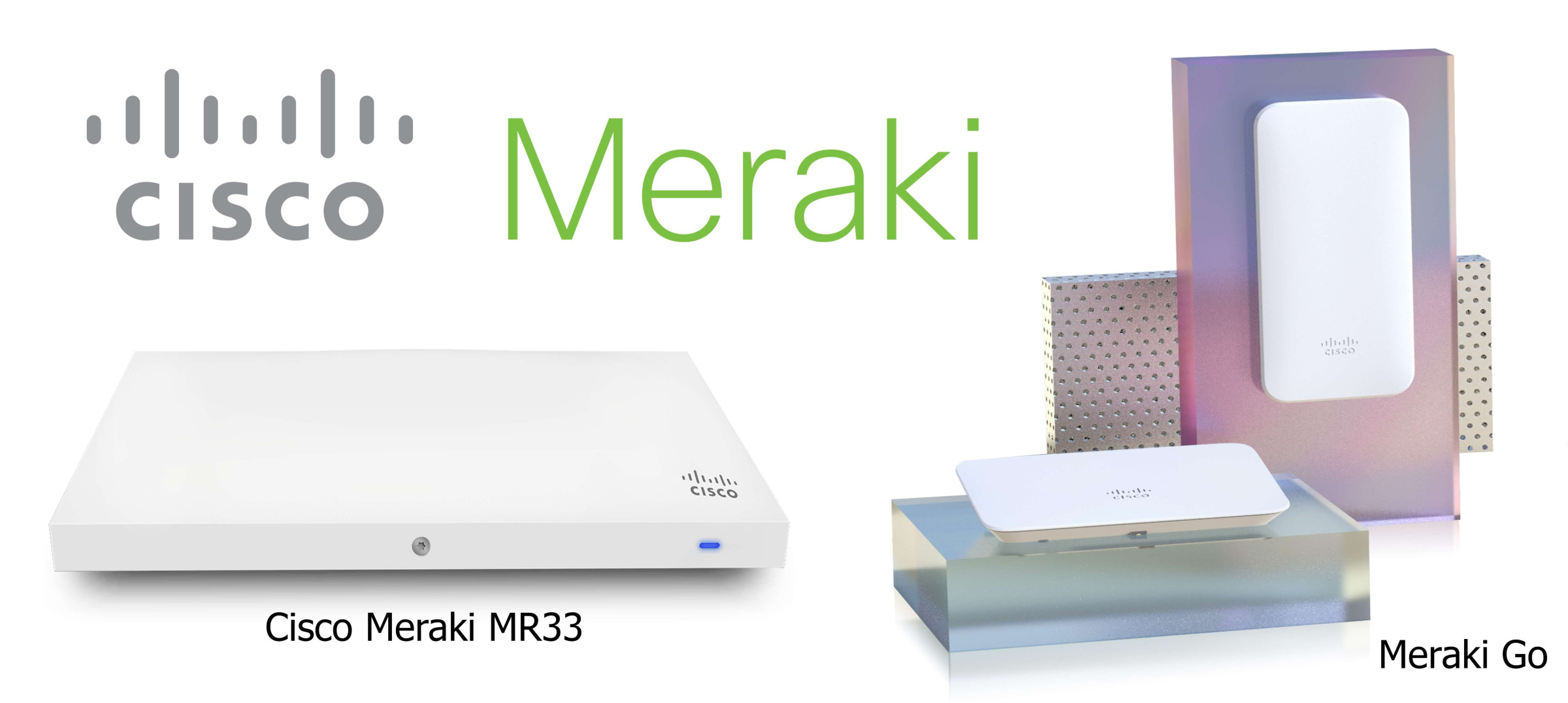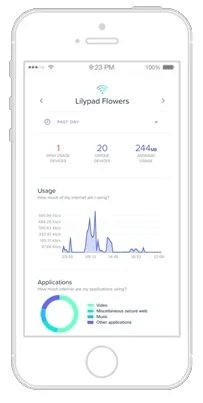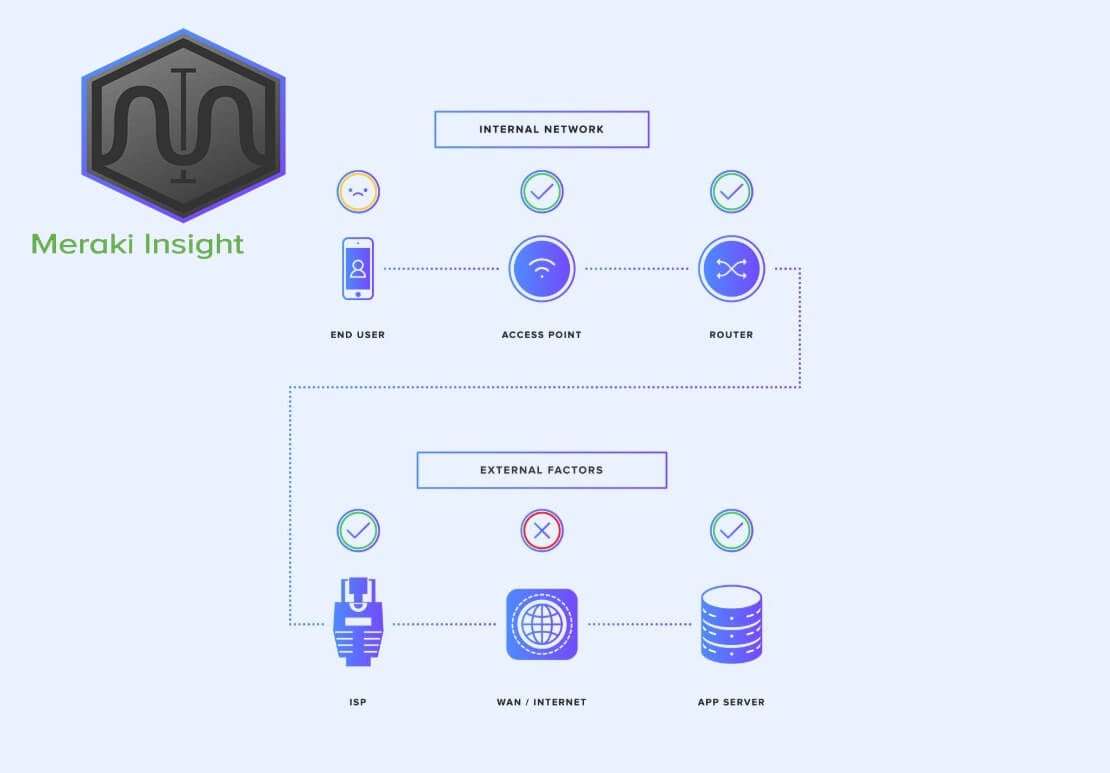Meraki Go vs. Meraki: Which Network Solution Is Right For You?

In today's fast-paced business environment, choosing the right network solution can significantly impact your business's efficiency, security, and growth potential. Cisco Meraki offers a range of cloud-managed networking products that have become a trusted solution for companies needing reliable and scalable networks. To meet the unique needs of small businesses, Cisco introduced the Meraki Go series, a simplified and affordable option for business owners without dedicated IT staff.
With the release of the Meraki Go series, many businesses are now asking about the differences between Meraki and Meraki Go and which solution aligns best with their specific needs. The following is a closer look at Meraki vs. Meraki Go to help determine which network solution might be the right fit for your business.
What Is Meraki Go?
Meraki Go is Cisco's line of networking products designed specifically for very small or micro businesses with 1-5 people in a small space. Developed with simplicity and affordability in mind, Meraki Go offers a straightforward, cloud-managed solution for business owners who may not have a dedicated IT team. It enables users to easily set up and manage their network through a mobile app, making it accessible even to those with limited technical expertise.
Meraki Go is particularly suited for micro-businesses, such as small retail shops, cafes, and home-based offices. These businesses require ease of use and reliable connectivity, but their technical requirements may not be as complex as those of larger organizations. These businesses benefit from a dependable, secure network that supports customer-facing Wi-Fi, secure point-of-sale systems, and the bandwidth to handle daily operations without interruptions.
The following are the key features that make Meraki Go an appealing choice for small and micro-business owners.
Key Features And Benefits Of Meraki Go
From setup to security, Meraki Go's features are tailored to make network management as intuitive as possible, helping business owners keep operations running smoothly without requiring advanced technical knowledge. Below are some of the standout features and benefits that make Meraki Go a valuable solution for micro-businesses and startups:
- Simplified setup:
Meraki Go's setup process is streamlined to be as user-friendly as possible, allowing small business owners to get their network up and running quickly. With the Meraki Go mobile app, the entire setup can be completed in a few straightforward steps—without the need for professional installation.
The app guides users through device configuration, network settings, and security preferences, making it easy to establish a stable, secure network even if you don't have a technical background. - Mobile app management:
 The Meraki Go smartphone app is designed for simplicity, providing small business owners with basic control over their network without overwhelming them with advanced options. While it lacks some of the features available in the full-sized Meraki Dashboard or other brands' enterprise-level management tools, the app offers essential controls for security and user access rights. This limited but effective approach allows users to manage network settings, monitor connected devices, and configure guest Wi-Fi with ease.
The Meraki Go smartphone app is designed for simplicity, providing small business owners with basic control over their network without overwhelming them with advanced options. While it lacks some of the features available in the full-sized Meraki Dashboard or other brands' enterprise-level management tools, the app offers essential controls for security and user access rights. This limited but effective approach allows users to manage network settings, monitor connected devices, and configure guest Wi-Fi with ease.
The "plug and play" nature of Meraki Go means small businesses can deploy a functional, straightforward network within minutes. For companies operating on a budget or without dedicated IT staff, this accessible management system provides all the fundamental networking capabilities needed to support daily operations. - Basic security:
Meraki Go provides essential security features to help small businesses protect their network and data without adding complexity. Users can set up basic security measures through the mobile app, such as blocking malicious websites, restricting user access, and configuring guest networks to separate customer traffic from internal business systems. This layer of security helps safeguard against common online threats and ensures that sensitive business information remains protected.
While not as advanced as enterprise-level solutions, Meraki Go's security features are more than adequate for micro-businesses that need foundational protections without the need for extensive configurations. - Wireless access points:
Meraki Go wireless access points are designed to provide reliable, high-speed Wi-Fi coverage throughout a small business environment. Built to handle the demands of small spaces such as retail shops, cafes, and offices, these access points ensure seamless connectivity for both staff and customers. With Meraki Go, users can set up multiple access points to cover larger areas, ensuring consistent signal strength without dead zones.
The Meraki Go access points also support dual-band Wi-Fi, enabling faster speeds and better connectivity by distributing network load across different frequencies. The access points also integrate with the Meraki Go app, allowing easy network performance monitoring, bandwidth usage, and connected devices. - Small-scale network monitoring:
Meraki Go includes simple yet effective network monitoring features tailored for small business needs. Through the Meraki Go app, business owners can easily monitor network health, view connected devices, and track bandwidth usage in real time. This enables users to quickly identify and troubleshoot connectivity issues, optimize bandwidth allocation, and ensure critical business applications have the necessary resources to function smoothly.
This level of monitoring, while more limited than enterprise-grade solutions, is ideal for micro-businesses that need to maintain control over their network without requiring extensive technical oversight. - Cloud-based updates:
Meraki Go's cloud-based system ensures that all network devices stay up-to-date with the latest software and security patches, automatically applying updates as they become available. This feature allows small business owners to maintain a secure, optimized network without the need for manual updates or technical interventions.
By managing updates through the cloud, Meraki Go reduces the risk of security vulnerabilities and helps businesses comply with modern security standards. It also allows for continuous improvements in network performance, delivering new features and enhancements without downtime or disruption.
What Is Cisco Meraki?
Cisco Meraki is a comprehensive, cloud-managed networking solution designed for businesses that require advanced, scalable network infrastructure. Unlike Meraki Go, which is geared towards small and micro-businesses, Meraki provides a range of robust features suitable for larger organizations and more complex IT environments. With tools that support centralized management, powerful security controls, and extensive customization options, Meraki allows businesses to tailor their networks to meet specific operational needs and growth demands.
Meraki is ideal for businesses with multi-site operations, higher device volumes, or complex security requirements that call for greater control and flexibility. It's equipped with a suite of tools that streamline network management while providing the scalability needed to grow alongside a business. Below are some key features and benefits that make Meraki an ideal solution for companies with more intricate networking needs.
Key Features And Benefits Of Meraki
Meraki’s advanced feature set includes powerful tools all delivered through an intuitive, cloud-based dashboard. These features give businesses the flexibility to adapt their networks to evolving requirements, optimize performance, and maintain robust security. The following are some of the key features that set Meraki apart as a high-performance networking solution for businesses.
- Unified cloud management:
One of Meraki's standout features is its unified cloud management system, which enables businesses to oversee all their network devices—such as switches, access points, and security appliances—from a single, centralized dashboard. This cloud-based platform provides real-time visibility into network performance, device status, and security settings, making it easy for IT teams to monitor and manage even large, complex networks across multiple locations.
With unified cloud management, businesses can streamline network operations, troubleshoot issues remotely, and implement updates or policy changes across the entire network with just a few clicks. - Unified cloud management:
Meraki's Software-Defined Wide Area Network (SD-WAN) functionality optimizes connectivity across multiple locations, providing businesses with reliable, secure, and cost-effective networking. SD-WAN uses intelligent traffic management to prioritize essential business applications, ensuring they have the bandwidth needed for smooth performance, even when multiple sites are connected over a single network.
With Meraki's SD-WAN, businesses gain better control over network performance, reducing latency, minimizing downtime, and improving application efficiency. This is especially valuable for organizations with distributed locations that require constant, high-quality connectivity, such as retail chains, branch offices, or remote teams. - Advanced security:
Meraki offers a comprehensive suite of advanced security features that protect business networks against a wide range of online threats. From built-in firewall protection to intrusion prevention, Meraki's security solutions are designed to safeguard sensitive data and ensure compliance with security standards. The system also includes content filtering, malware protection, and real-time threat intelligence to proactively identify and block suspicious activities.
In addition, Meraki's security capabilities are fully integrated within its cloud management dashboard, allowing IT teams to monitor, respond to, and manage security threats from a single interface. - Wireless access points:
Meraki's wireless access points provide high-performance, reliable Wi-Fi connectivity tailored to businesses with large or high-density environments. These access points, built with advanced features such as beamforming and MU-MIMO (Multi-User, Multiple Input, Multiple Output), ensure strong, consistent signal strength even in areas with numerous connected devices. This makes them ideal for organizations like schools, offices, and retail spaces where seamless Wi-Fi is essential for both employees and guests
Integrated with the Meraki cloud dashboard, the access points allow IT administrators to monitor Wi-Fi performance, control bandwidth usage, and manage access policies from a single interface. Additionally, Meraki access points include robust security measures to protect against unauthorized access, ensuring the network remains secure and dependable. - Intelligent network switches:
Meraki's intelligent network switches provide businesses with the flexibility, security, and control needed to manage complex, multi-device environments. These cloud-managed switches allow for seamless connectivity across devices and enable efficient traffic management, which helps maintain optimal performance for essential business applications. With features like Layer 3 routing, Power over Ethernet (PoE), and advanced security settings, Meraki switches are built to support both simple and highly demanding network configurations.
The Meraki dashboard enhances switch management by offering real-time insights into network health, traffic flows, and device statuses. IT teams can quickly identify and resolve network issues, set traffic priorities, and implement security policies directly from the cloud-based interface. - VPN:
Meraki's integrated VPN functionality enables secure, encrypted connections between different business locations and remote workers, allowing employees to access network resources safely from anywhere. With Meraki's Auto VPN feature, IT teams can quickly establish site-to-site VPNs without the need for complex manual configurations. This simplifies remote connectivity, ensuring that data remains protected as it travels across the network.
The VPN is managed through the Meraki dashboard, where administrators can monitor connections, manage bandwidth, and adjust settings as needed. This centralized control makes it easy to scale VPN access as the business grows, supporting a secure and flexible working environment.
- Comprehensive network analytics:
Meraki's comprehensive network analytics offer deep insights into network performance, user behavior, and device activity, empowering businesses to make informed decisions about their network infrastructure. Through the Meraki dashboard, IT teams can monitor real-time data on bandwidth usage, application performance, and device connectivity, allowing them to quickly identify and resolve potential issues before they impact operations.
These analytics provide valuable metrics that help businesses optimize their network, such as identifying high-traffic periods, prioritizing critical applications, and understanding user trends. Meraki's intelligent reporting tools also allow for customizable alerts and detailed reports, enabling proactive network management and planning.
Factors To Consider In Choosing The Right Network Solution
Choosing the right network solution ensures smooth operations, secure connectivity, and scalability as your business grows. When evaluating options like Meraki and Meraki Go, it's important to consider network complexity, budget, management capabilities, and security needs. Each solution is tailored to different business environments, so understanding your unique requirements will help you make an informed decision that best aligns with your goals.
Pricing
Budget plays a critical role when choosing the right network solution, and Meraki and Meraki Go are positioned to meet the needs of businesses with different financial and operational requirements. Meraki Go is intentionally designed as a cost-effective entry point into the Meraki ecosystem, making it an ideal choice for micro or small businesses. Its budget-friendly pricing aligns well with startups or single-location businesses that need foundational networking without high upfront costs or ongoing expenses.
However, Meraki Go's limited feature set is best suited for stable or smaller-scale operations. As a business grows, its network demands become more complex, often requiring additional functionality, flexibility, and control. For companies with larger setups or multi-location needs, the main line of Meraki products offers a comprehensive suite of features and the scalability to support growth. Meraki provides advanced management options, robust security, and the ability to integrate a range of IoT devices, all within a single, centralized dashboard.
If budget is a primary consideration and your business has simple networking needs, Meraki Go provides solid value. For those anticipating growth or requiring more advanced capabilities, investing in the full Meraki line ensures your network can adapt to evolving demands.
Advanced Features
While Meraki Go provides essential networking capabilities for small and micro-businesses, the main Meraki line offers a range of advanced features tailored for larger, more complex network environments. These features are designed to meet the demands of businesses with multi-location setups, high network traffic, and specific security or application needs.
- SD-WAN: One of Meraki's key advanced features is Software-Defined Wide Area Networking (SD-WAN), which allows businesses to optimize connectivity across multiple sites. SD-WAN intelligently manages traffic to ensure critical applications receive priority bandwidth, enhancing performance and reducing latency. This feature is invaluable for businesses with remote branches or high data needs, as it provides reliable connectivity and seamless application performance.
- Layer 7 application control: Meraki also includes Layer 7 application control, a powerful tool that enables businesses to identify, monitor, and manage traffic for specific applications. This level of control allows IT administrators to prioritize or limit bandwidth for certain applications, enhancing network efficiency and ensuring that essential tools and services maintain optimal performance. For example, Layer 7 controls allow businesses to prioritize VoIP or video conferencing traffic while restricting non-essential streaming to improve productivity.
- Granular security and policy enforcement: Meraki's full suite also provides enhanced security capabilities, including advanced firewall settings, intrusion prevention, and content filtering. These tools allow businesses to establish detailed security policies, protecting their networks against evolving cyber threats and ensuring compliance with security standards.
While Meraki Go delivers the basics for small setups, businesses with more intricate requirements will find Meraki's advanced features indispensable for managing a scalable, secure, and high-performing network. These added capabilities are particularly beneficial for organizations that rely on complex applications, require robust security, or need to connect multiple locations with optimized reliable network infrastructure.
Ease Of Use
Meraki Go is all about simplicity: it provides affordable, high-quality business-class hardware that small business owners can set up within minutes, even without prior IT experience. Designed with small cafes, bookstores, boutique shops, and other similar businesses in mind, Meraki Go streamlines everything from deployment settings to configuration, all through an intuitive smartphone-based app. This makes it easy for owners to manage their network without needing a technical background, making it ideal for straightforward, single-location setups.
In short, Meraki Go serves as an "entry-level" networking line intended for startups, home offices, and small businesses with limited IT knowledge. For those who need more advanced capabilities, greater control, or a larger-scale network setup, the main Meraki line is better suited, offering enhanced features and scalability. For businesses that prioritize ease of use and minimal setup, Meraki Go delivers an accessible solution without sacrificing quality.
Technical Support
The technical support requirements differ significantly between Meraki and Meraki Go, reflecting their targeted business sizes and complexities. Meraki, designed for larger, multi-site businesses with complex network needs, requires robust, 24/7 enterprise-grade support. With its extensive features, such as SD-WAN, Layer 7 application control, and advanced security configurations, Meraki's full line often needs around-the-clock assistance to address potential issues, implement updates, and manage system configurations effectively. This level of support ensures that critical network functions remain uninterrupted and optimally managed.
In contrast, Meraki Go is built for small businesses with simpler networking requirements, reducing the need for comprehensive, always-on support. Since Meraki Go is easy to set up and manage through a mobile app, it typically requires minimal assistance beyond basic troubleshooting. The streamlined design and entry-level feature set mean Meraki Go users can often resolve issues independently or with standard support options, making it a cost-effective choice for smaller businesses without dedicated IT teams.
While Meraki's enterprise-grade support is necessary for larger, more intricate setups, Meraki Go provides small businesses with the essential support needed to maintain reliable connectivity without the cost or complexity of 24/7 technical assistance.
Licensing Model
Meraki and Meraki Go differ significantly in their licensing models, each designed to suit the needs of their respective audiences. Meraki Go provides a straightforward, hardware-based model without mandatory subscriptions or recurring fees. Once you purchase the Meraki Go hardware, your network operates without additional licensing costs, making it an appealing choice for startups and small businesses with limited budgets that prioritize affordability and simplicity.
On the other hand, Meraki's main product line uses a subscription-based licensing model, requiring businesses to purchase licenses that align with their network devices. These licenses come in various terms, typically one to ten years, and include access to the Meraki cloud management platform, firmware updates, and technical support. This subscription approach ensures that businesses can keep their networks up-to-date with the latest features, security patches, and support—an essential consideration for larger organizations with complex network requirements.
The key differences between these models lie in cost structure, feature access, and scalability. Meraki Go's one-time hardware purchase with no ongoing fees makes it cost-effective for smaller setups, while Meraki's subscription model provides continuous updates, access to advanced features, and a scalable framework for organizations anticipating growth or requiring more robust network management.
Customizability
Meraki Go and Meraki differ notably in terms of customizability, reflecting their distinct audiences and use cases. Meraki Go is designed as a mostly plug-and-play solution, ideal for small businesses that need straightforward, reliable networking without complex configurations.
The setup process is simple, and the options available through the Meraki Go mobile app are pre-configured to cover essential networking needs, such as basic security, guest Wi-Fi, and device monitoring. This streamlined approach makes it easy for non-technical users to deploy and manage a network, but it means there are limited customization options for more specific or advanced configurations.
In contrast, Meraki offers extensive customizability, providing the flexibility to tailor network settings and features to specific business requirements. IT administrators can manage intricate settings through the Meraki cloud dashboard, including detailed security policies, traffic shaping, application control, and Layer 3 routing. This level of customization allows businesses to optimize their network for particular applications, prioritize bandwidth, and meet unique security or operational needs.
For businesses that require high adaptability and control, Meraki's full range of customizable options offers the tools necessary to design a network that supports their specific demands. On the other hand, Meraki Go's pre-configured, plug-and-play setup is best suited for small businesses that need a simple, effective solution without the need for advanced customization.
| Integration with other services | Meraki Go Limited integration, primarily self-contained within Meraki Go's ecosystem | Meraki Full integration with other Cisco products, APIs for custom solutions, and compatibility with third-party services |
Meraki’s Seamless Integration With Other Services
Meraki offers seamless integration with a wide range of services, enhancing network functionality and providing additional capabilities that support business needs. By connecting with third-party tools and platforms, Meraki allows businesses to streamline operations, improve security, and enable richer data insights. Integrating Meraki with other services can simplify tasks such as user authentication, network monitoring, and data analytics, providing a unified solution for managing and optimizing network performance.
Here are some essential services that Meraki can integrate with to expand its capabilities:
Cloud Applications
Meraki's seamless integration with popular cloud applications such as Microsoft 365, Google Workspace, and Salesforce brings enhanced network performance and security, supporting businesses in optimizing these essential tools.
By integrating with these cloud applications, Meraki enables IT teams to prioritize bandwidth for critical services, ensuring reliable connectivity and minimizing workflow disruptions. This is especially valuable for organizations heavily dependent on cloud-based collaboration, as Meraki can allocate resources to maintain high performance for these applications, even during peak usage.
In terms of security, Meraki's integration capabilities allow for synchronized identity and access management across platforms. For instance, by linking with Microsoft 365 or Google Workspace, administrators can streamline user authentication, enforce secure access policies, and apply customized permissions. These integrations also support compliance efforts, ensuring that sensitive data exchanged through cloud applications is protected with advanced security protocols.
Third-Party Security Solutions
Meraki integrates with leading security vendors like Palo Alto Networks, Check Point, and Fortinet to provide enhanced threat protection through multi-layered defenses. By connecting with these third-party solutions, Meraki networks benefit from advanced features such as firewall configurations, intrusion prevention systems, and deep packet inspection, allowing real-time threat detection and mitigation.
These integrations streamline security management, enabling IT administrators to monitor and enforce consistent security policies across all network devices from a centralized dashboard. With tools like Check Point's proactive threat intelligence and Fortinet's advanced firewall capabilities, Meraki enhances its network security to meet evolving cybersecurity challenges. Meraki's compatibility with top security providers delivers a comprehensive, scalable security solution for businesses requiring robust protection.
IT Management Tools
Meraki integrates with IT management platforms such as ServiceNow and Zendesk, streamlining network management and troubleshooting for businesses. These integrations enable IT teams to monitor network health, manage support tickets, and resolve issues more efficiently through a unified interface.
By connecting Meraki with ServiceNow, administrators can automate incident tracking, receive real-time alerts, and prioritize tasks directly within their service management platform. Similarly, Zendesk integration allows IT teams to respond quickly to user-reported issues, track network performance, and create a seamless support experience. This compatibility helps businesses reduce downtime, improve response times, and maintain a well-organized approach to network management.
IoT Platforms
Meraki's integration with IoT platforms allows businesses to efficiently manage and monitor IoT devices across their network, providing greater visibility and control over connected devices. By li




